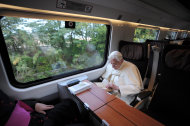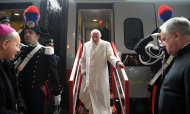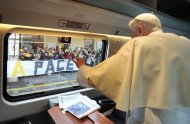ASSISI, Italy (AP) — Pope Benedict XVI joined Buddhist monks, Islamic scholars, Hindus and a handful of agnostics in making a communal call for peace Thursday, insisting that religion must never be used as a pretext for war or terrorism.
Benedict welcomed some 300 leaders representing a rainbow of faiths to the hilltop Italian town of Assisi to commemorate the 25th anniversary of a daylong prayer for peace here called by Pope John Paul II in 1986 amid Cold War conflicts.One by one, the monks, priests and patriarchs stood up and committed themselves to working for dialogue, justice and peace, and for a more equitable and friendly world.
While the event lacked the urgency and star power of 1986, when the Dalai Lama, Mother Teresa and others came together to pray, Thursday's peace meeting included some novelties. Buddhist monks from mainland China were on hand as were four participants who profess no faith at all — part of Benedict's efforts to reach out to agnostics and atheists who are searching for truth.
And, unlike the 1986 event and successive ones in 1993 and 2002, there was no time given for any type of communal prayer — a key element of the previous editions in providing images of the world's great religions praying for peace. Benedict had objected to the 1986 event and didn't attend because he disapproved of members of different faiths praying in the presence of one another.As a result, his 25th anniversary edition removed any whiff of syncretism, or the combining of different beliefs and practices. After a lunch of vegetarian risotto, salad and fruit, the participants retired to hotel rooms where they could pray individually or nap before returning for some concluding remarks.
In his opening speech, the German-born Benedict noted that in the 25 years since John Paul's peace day, the Berlin Wall had crumbled without bloodshed but that religion is now frequently being used to justify violence. He said it was wrong to demand that faith disappear from daily life to somehow rid the world of a religious pretext for violence, arguing that the absence of God from people's daily lives was even more dangerous.
"The horrors of the concentration camps reveal with utter clarity the consequences of God's absence," said Benedict, who as a young German was forced to join the Hitler Youth.
Traditionalist Catholics condemned the Assisi meeting — just as they did the one in 1986 — saying it was blasphemy for the pope to invite leaders of "false" religions to pray to their Gods for peace. The Society of St. Pius X, a breakaway traditionalist group that Benedict has been working to bring back into Rome's fold, said it would be celebrating 1,000 Masses to atone for the damage done by the event and urged the pope to use it to urge others to convert to Catholicism.
The issue is a sensitive one for Benedict, who has railed against religious relativism, or the idea that there are no absolute truths and that all religions are somehow equal. As then-Cardinal Joseph Ratzinger, he issued a controversial document in 2000 in part as a response to the 1986 Assisi event asserting that the fullness of the means of salvation was found in the Catholic Church alone.
That said, at the end of the day Benedict knelt down in prayer in front of the tomb of St. Francis, whose peace-loving message has made Assisi a pilgrimage destination for centuries. Silently standing behind him were the leaders of the other religious delegations.
The Archbishop of Canterbury Rowan Williams, the head of the worldwide Anglican Communion, said the delegates weren't gathered in Assisi to come to a "minimum common ground of belief."
Rather, he said, the meeting would show the world that through their distinctiveness, different faiths provide the wisdom to draw upon "in the struggle against the foolishness of a world still obsessed with fear and suspicion, still in love with the idea of a security based on active hostility, and still capable of tolerating or ignoring massive loss of life among the poorest through war and disease."
And there was a lot of distinctiveness on hand. Standing on the altar of St. Mary of the Angels basilica, Wande Abimbola of Nigeria, representing Africa's traditional Yoruba religion, sang a prayer and shook a percussion instrument as he told the delegates that peace can only come with greater respect for indigenous religions.
"We must always remember that our own religion, along with the religions practiced by other people, are valid and precious in the eyes of the Almighty, who created all of us with such plural and different ways of life and belief systems," he said.
Thursday's meeting also included Ecumenical Patriarch Bartholomew I and representatives from Greek, Russian, Serbian and Belarusian Orthodox churches as well as Lutheran, Methodist and Baptist leaders. Several rabbis were joined by some 60 Muslims, a half-dozen Hindus and Shinto believers, three Taoists, three Jains and a Zoroastrian.






No comments:
Post a Comment